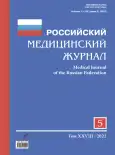Изучение влияния вортиоксетина на сексуальную функцию в сравнении с циталопрамом у амбулаторных пациентов с депрессиями непсихотического уровня
- Авторы: Крылатых В.Ю.1, Алешкина Г.А.2
-
Учреждения:
- Центр психосоматической медицины и психотерапии
- Московский государственный медико-стоматологический университет имени А.И. Евдокимова
- Выпуск: Том 28, № 5 (2022)
- Страницы: 333-343
- Раздел: Оригинальные исследования
- URL: https://bakhtiniada.ru/0869-2106/article/view/111063
- DOI: https://doi.org/10.17816/medjrf111063
- ID: 111063
Цитировать
Аннотация
Обоснование. Отрицательное влияние сексуальной дисфункции на качество жизни часто недооценивается, хотя она является одним из определяющих факторов для оценки переносимости антидепрессантов. По результатам международных исследований, распространённость сексуальной дисфункции у пациентов с депрессией, лечившихся селективными ингибиторами обратного захвата серотонина или селективными ингибиторами обратного захвата серотонина и норадреналина, составляет 27–65% у женщин и 26–57% у мужчин. Лечение с меньшим количеством неблагоприятных эффектов следует рассматривать как потенциальный вариант первой линии у пациентов с психическими заболеваниями, заинтересованных в сохранении полноценной половой жизни.
Цель исследования — сравнить влияние вортиоксетина и циталопрама на сексуальную функцию у амбулаторных пациентов с депрессиями непсихотического уровня.
Материалы и методы. Исследование проводили на базе ООО «Центр психосоматической медицины и психотерапии». Обследовано 134 пациента (средний возраст — 35,8±7,6 года), проходивших амбулаторное лечение у врача-психиатра. Вортиоксетин получал 71 пациент: 45 больных с депрессивными состояниями эндогенного генеза (15 обследуемых с аффективными расстройствами и 30 — с шизотипическим расстройством) и 26 больных с расстройством адаптации. Циталопрам был назначен 63 пациентам: 39 с депрессивными состояниями в рамках эндогенных заболеваний (18 обследуемых с аффективными расстройствами и 21 — с шизотипическим расстройством) и 24 пациентам с расстройством адаптации. Исследование длилось 6 нед, по его окончании проводили оценку сексуальной функции.
Результаты. В группах, принимавших вортиоксетин и циталопрам, выявлены существенные различия в частоте возникновения сексуальной дисфункции: приём вортиоксетина, в отличие от циталопрама, позволял пациентам сохранять либидо и оргастическую функцию, а в ряде случаев способствовал восстановлению сексуальной сферы.
Заключение. Полученные данные показали, что профиль вортиоксетина статистически значимо более благоприятен в отношении сексуальной функции.
Полный текст
Открыть статью на сайте журналаОб авторах
Виктория Юрьевна Крылатых
Центр психосоматической медицины и психотерапии
Автор, ответственный за переписку.
Email: ssamara@yandex.ru
ORCID iD: 0000-0002-3583-6962
SPIN-код: 6734-8701
Россия, Москва
Галина Андреевна Алешкина
Московский государственный медико-стоматологический университет имени А.И. Евдокимова
Email: aleshkina-ga@yandex.ru
ORCID iD: 0000-0002-8872-9810
SPIN-код: 7477-8598
д.м.н., профессор
Россия, МоскваСписок литературы
- World Health Organization. Depression [Internet]. Дата обращения: 04.06.2022. Доступ по ссылке: https://www.who.int/ru/news-room/fact-sheets/detail/depression
- Steffen A., Thom J., Jacobi F., et al. Trends in prevalence of de pres sion in Germany between 2009 and 2017 based on nationwide ambulatory claims data // J Affect Disord. 2020. Vol. 271. P. 239–247. doi: 10.1016/j.jad.2020.03.082
- Смулевич А.Б. Депрессия как общемедицинская проблема: вопросы клиники и терапии // Психиатрия и психофармакотерапия. 2006. Т. 8, № 3. С. 4–10.
- Бунькова К.М., Изюмина Т.А., Репин С.А. Формирование ремиссии и качество жизни у пациентов с непсихотическими депрессиями // Вестник неврологии, психиатрии и нейрохирургии. 2014. № 8. С. 3–7.
- Курсаков А.А., Бобров А.Е. Депрессии с униполярным и биполярным течением в условиях первичной медикосанитарной помощи: клинические, поведенческие особенности и исходы терапии // Современная терапия психических расстройств. 2016. № 4. С. 2–10.
- Щукина Е.П., Бунькова К.М., Изотова Е.А., Гончарова Е.М. Сравнительное исследование эффективности препаратов венлафаксин и амитриптилин у больных с тревожными депрессиями // Российский медицинский журнал. 2012. Т. 18, № 2. С. 21–24.
- Jacobsen P.L., Nomikos G.G., Zhong W., et al. Clinical implications of directly switching antidepressants in well-treated depressed patients with treatment-emergent sexual dysfunction: a comparison between vortioxetine and escitalopram // CNS Spectr. 2020. Vol. 25, N 1. P. 50–63. doi: 10.1017/S1092852919000750
- Wang S.-M., Han C., Bahk W.-M., et al. Addressing the side effects of contemporary antidepressant drugs: a comprehensive review // Chonnam Med J. 2018. Vol. 54, N 2. P. 101–112. doi: 10.4068/cmj.2018.54.2.101
- Edinoff A.N., Akuly H.A., Hanna T.A., et al. Selective serotonin reuptake inhibitors and adverse effects: a narrative review // Neurol Int. 2021. Vol. 13, N 3. P. 387–401. doi: 10.3390/neurolint13030038
- Chokka P.R., Hankey J.R. Assessment and management of sexual dysfunction in the context of depression // Ther Adv Psychopharmacol. 2018. Vol. 8, N 1. P. 13–23. doi: 10.1177/2045125317720642
- Montejo A.L., Montejo L., Baldwin D.S. The impact of severe mental disorders and psychotropic medications on sexual health and its implications for clinical management // World Psychiatry. 2018. Vol. 17, N 1. P. 3–11. doi: 10.1002/wps.20509
- Ramic E., Prasko S., Gavran L, Spahic E. Assessment of the antidepressant side effects occurrence in patients treated in primary care // Mater Sociomed. 2020. Vol. 32, N 2. P. 131–134. doi: 10.5455/msm.2020.32.131-134
- Торчинов А.М., Барденштейн Л.М., Умаханова М.М., Харха рова М.А. Современные аспекты депрессивных расстройств у женщин в перименопаузе // Журнал Российского общества акушеров-гинекологов. 2006. № 3. С. 34–38.
- Basson R., Gilks T. Women’s sexual dysfunction associated with psychiatric disorders and their treatment // Womens Health (Lond). 2018. Vol. 14. P. 1745506518762664. doi: 10.1177/1745506518762664
- Chilmonczyk Z., Bojarski A.J., Pilc A., Sylte I. Functional selectivity and antidepressant activity of serotonin 1A receptor ligands // Int J Mol Sci. 2015. Vol. 16, N 8. P. 18474–18506. doi: 10.3390/ijms160818474
- Chen C., Shan W. Pharmacological and non-pharmacological treatments for major depressive disorder in adults: a systematic review and network meta-analysis // Psychiatry Res. 2019. Vol. 281. P. 112595. doi: 10.1016/j.psychres.2019.112595
- Jacobsen P., Zhong W., Nomikos G., Clayton A. Paroxetine, but not Vortioxetine, impairs sexual functioning compared with placebo in healthy adults: a randomized, controlled trial // J Sex Med. 2019. Vol. 16, N 10. P. 1638–1649. doi: 10.1016/j.jsxm.2019.06.018
- Baldwin D.S., Chrones L., Florea I., et al. The safety and tolerability of vortioxetine: analysis of data from randomized placebo-controlled trials and open-label extension studies // J Psychopharmacol. 2016. Vol. 30, N 3. P. 242–252. doi: 10.1177/0269881116628440
Дополнительные файлы







